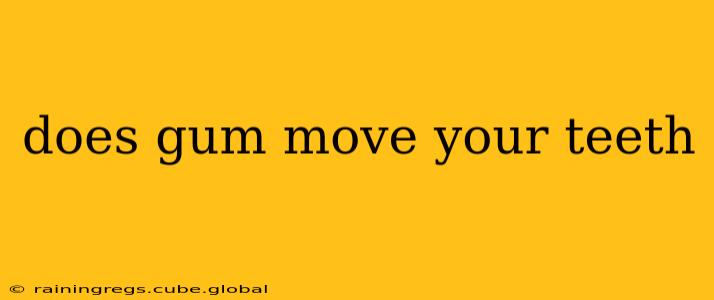Does Gum Move Your Teeth? Unpacking the Truth About Chewing Gum and Oral Health
The question of whether chewing gum moves your teeth is a common one, sparking curiosity and concern among many. The simple answer is: no, chewing gum itself doesn't move your teeth in a significant, noticeable way. However, the impact of chewing gum on your teeth and overall oral health is far more nuanced than a simple yes or no. Let's delve deeper into the specifics.
Does Chewing Gum Affect Tooth Position?
While chewing gum won't shift your teeth dramatically, the act of chewing does exert pressure on your teeth and jaw. This pressure, however, is generally insufficient to cause any significant movement of teeth in adults whose jaw development is complete. The forces generated by chewing gum are far less than those applied during orthodontic treatment (braces), which use precisely calibrated forces to gradually move teeth into desired positions. Therefore, the impact on tooth position is negligible.
Can Chewing Gum Affect My Jaw Joint?
Excessive chewing or aggressive chewing of gum could potentially strain the temporomandibular joint (TMJ), the joint connecting your jaw to your skull. This strain might manifest as jaw pain or discomfort. For individuals already experiencing TMJ issues, excessive gum chewing could exacerbate their condition. Moderate chewing, however, shouldn't cause problems.
What About the Effect of Chewing Gum on Tooth Enamel?
Some types of gum, particularly those containing sugar, can contribute to tooth decay. The sugar feeds bacteria in your mouth, which produce acids that erode tooth enamel. However, sugar-free gum, especially those containing xylitol, can actually benefit oral health. Xylitol inhibits the growth of cavity-causing bacteria.
Does Chewing Gum Strengthen Teeth?
The act of chewing gum, especially sugar-free varieties, can increase saliva production. Saliva plays a crucial role in neutralizing acids, removing food particles, and remineralizing teeth, thereby promoting oral health and potentially reducing the risk of cavities. However, it's important to remember that chewing gum is not a substitute for proper brushing and flossing.
Can Gum Help Clean Teeth?
While chewing gum can stimulate saliva production, it's not a substitute for brushing and flossing. Chewing gum cannot remove plaque and food particles effectively, which are the primary causes of cavities and gum disease. Think of gum as a supplemental tool, not a replacement for proper oral hygiene practices.
Does Chewing Gum Help with Tooth Sensitivity?
Some research suggests that chewing sugar-free gum may help reduce tooth sensitivity. This is possibly due to the increased saliva production and the stimulation of the jaw muscles. However, more research is needed to confirm this definitively.
In Conclusion:
Chewing gum doesn't directly move your teeth. The forces involved are too minor to cause significant changes in tooth position. However, the type of gum (sugar-free vs. sugary), the amount of chewing, and the overall impact on saliva production all contribute to the ultimate effect on oral health. Maintaining good oral hygiene through consistent brushing, flossing, and regular dental checkups remains crucial for optimal tooth and gum health regardless of chewing gum habits. If you experience any jaw pain or discomfort, consult a dentist or orthodontist.
